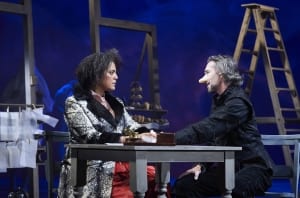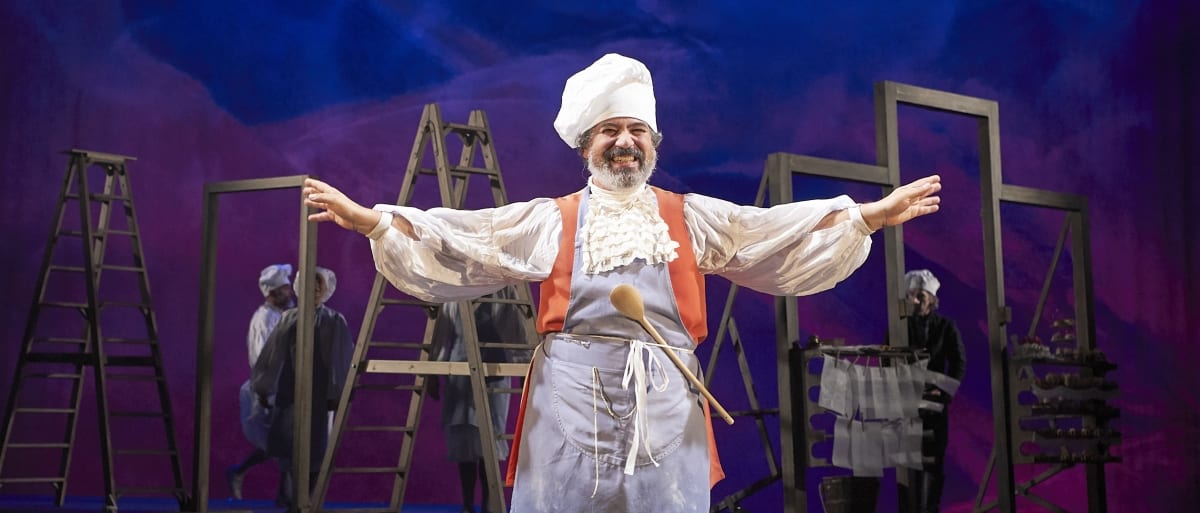Paris, in the second half of the 17th century. Enter nuns, singing hymns of repressed lust under an autumnal apple tree. An overlarge moon is shining in the background. The scene is set for this Bristol Old Vic’s new staging of Cyrano, full of commedia dell’arte references and surreal visual troves.
The production opens as a conversation between an ageing Cyrano (Tristan Sturrock) and his cousin Roxane (Sara Powell), now a nun who took the veil after the demise of her husband Christian de Neuvilette (Patrycja Kujawska). Cyrano loves Roxane and has been paying her regular visits ever since she retired to a convent; Roxane is unaware of Cyrano’s feelings, and the two remember their past and the day when Roxane met her dead husband. Cue the three knocking sounds which serve, in France, as a traditional opener for theatrical performances.
We are now 15 years prior to the start of the play, and Cyrano loves Roxane. Roxane loves wit and swoons over an apt turn of phrase. Cyrano has wit, but feels his ugliness (or, basically, his big nose) must forever stand between him and his love. Meanwhile, Roxane falls in love with a witless beau, Christian. Cyrano devises the strange plot to help Christian seduce Roxane by writing his love letters for him.
The popularity of Cyrano de Bergerac in France cannot be overstated. Edmond Rostand’s play was first performed in 1898 to overwhelming acclaim. Its fiery bravado, unapologetic romanticism, and alexandrine verses made Cyrano an anomaly at the end of the 19th century when such conventions were already outmoded by the likes of Chekov and Ibsen. Even for its time, the play had an undeniable tinge of nostalgia, a trait only accentuated by the production’s framing of the play as a flashback. Similarly, we are allowed to ask ourselves: what can Cyrano tell the present day?

Rewatching the play now, it strikes me that Cyrano’s ghostwriter gig does risk coming across as less than savoury and that his promise to Christian that “we shall seduce her” is, after all, premised upon Roxane’s ignorance. Yet the magic of the script operates and Cyrano’s love for his cousin still hits me every time. Peter Oswald’s translation is as sharp as one could hope. These qualities only aggravated my frustration at the majority of the first act, where those lines are only half audible through the over-the-top physical comedy surrounding Cyrano’s first entrance on stage. A lot of the pantomime that accompanied it felt like it could have been toned down a notch, as did the over-reliance on easy jokes that added little to the original comedy. Perhaps the slight artificiality of the whole is also an effect of the play’s own flaws, after all, but I found myself enjoying the show a lot more at times once the production became slightly less self-consciously farcical and allowed the play’s original take on performance, theatricality, and the pitfalls of love to speak for itself.
As Roxane, Sara Powell gives her role undeniable substance, and Felix Hayes’s performance is almost enough in itself to redeem the play’s main antagonist, de Guiche. Patrycja Kujawska manages to inject some humour into Christian, quite a feat if one considers that her character is intentionally written to be vapid. Miltos Yerolemou flawlessly capers around as a poet baker and an enamoured usherette. Finally, it took me a minute to get behind Tristan Sturrock’s interpretation of Cyrano, but this may well have been an effect of the pantoization of the play in Act 1, after which it becomes hard to look away from him.
Ti Green’s poetic set reveals the surreal potential of Cyrano, a play where poetry undeniably wins the day. It also pays homage to the original Cyrano himself, who was a bit of a poet, a bit of an inventor, and a bit of a soldier, as well as the author of strange texts on the moon and its inhabitants. On stage, the pages of Cyrano’s manuscripts fly and flap like the wings of strange birds. It is in those moments, more delicate and bittersweet, that the production truly comes into its own.

